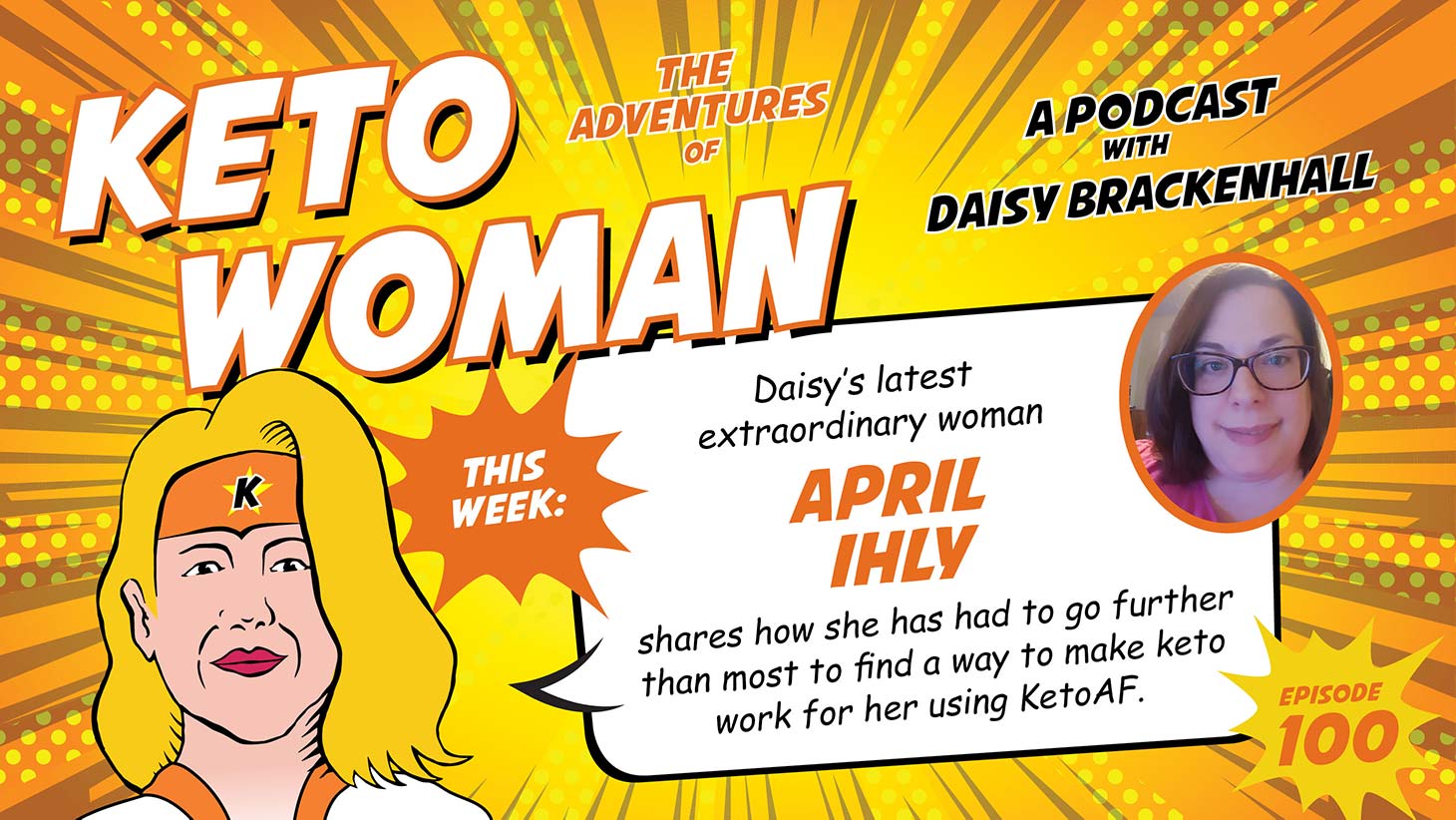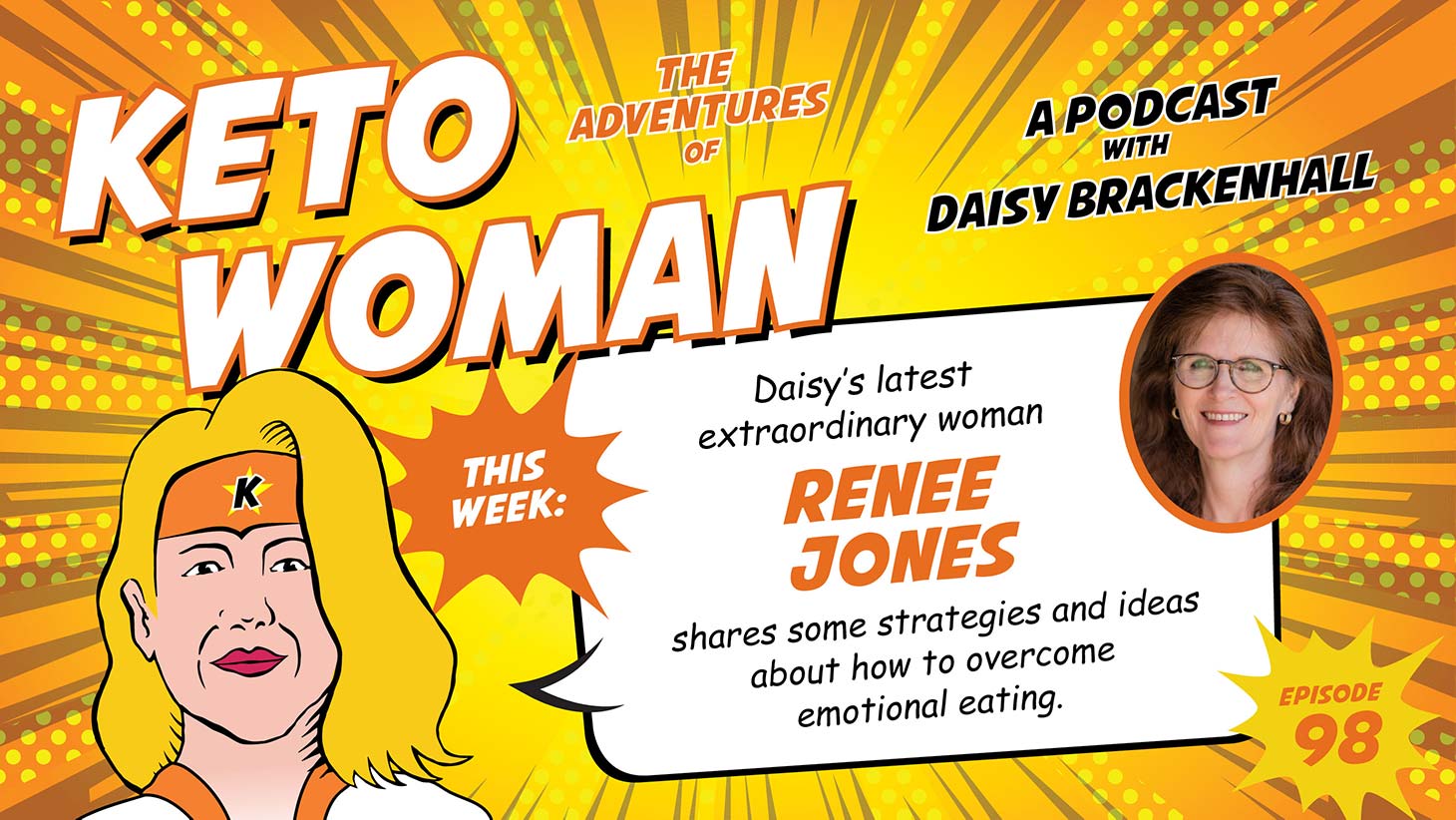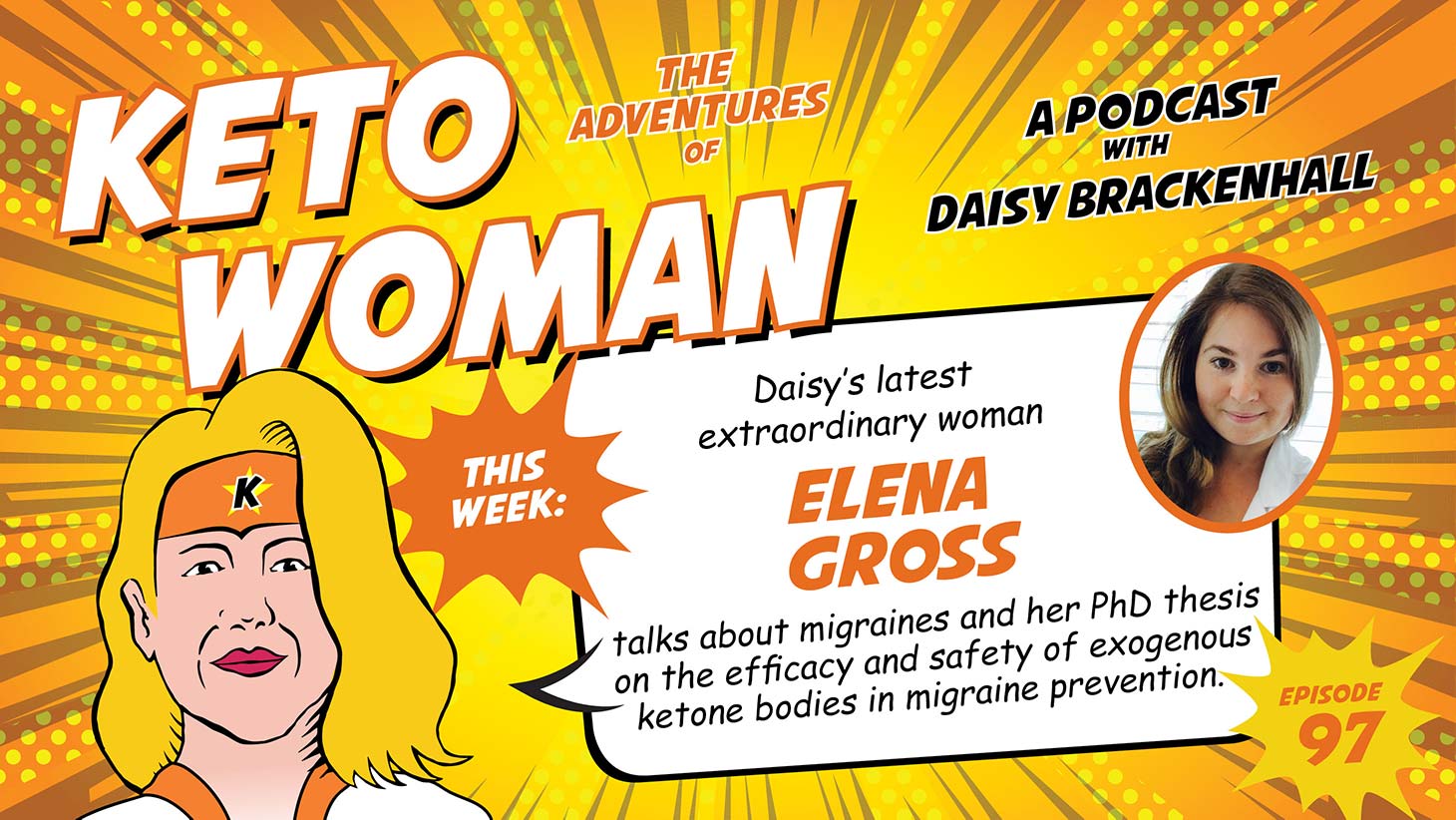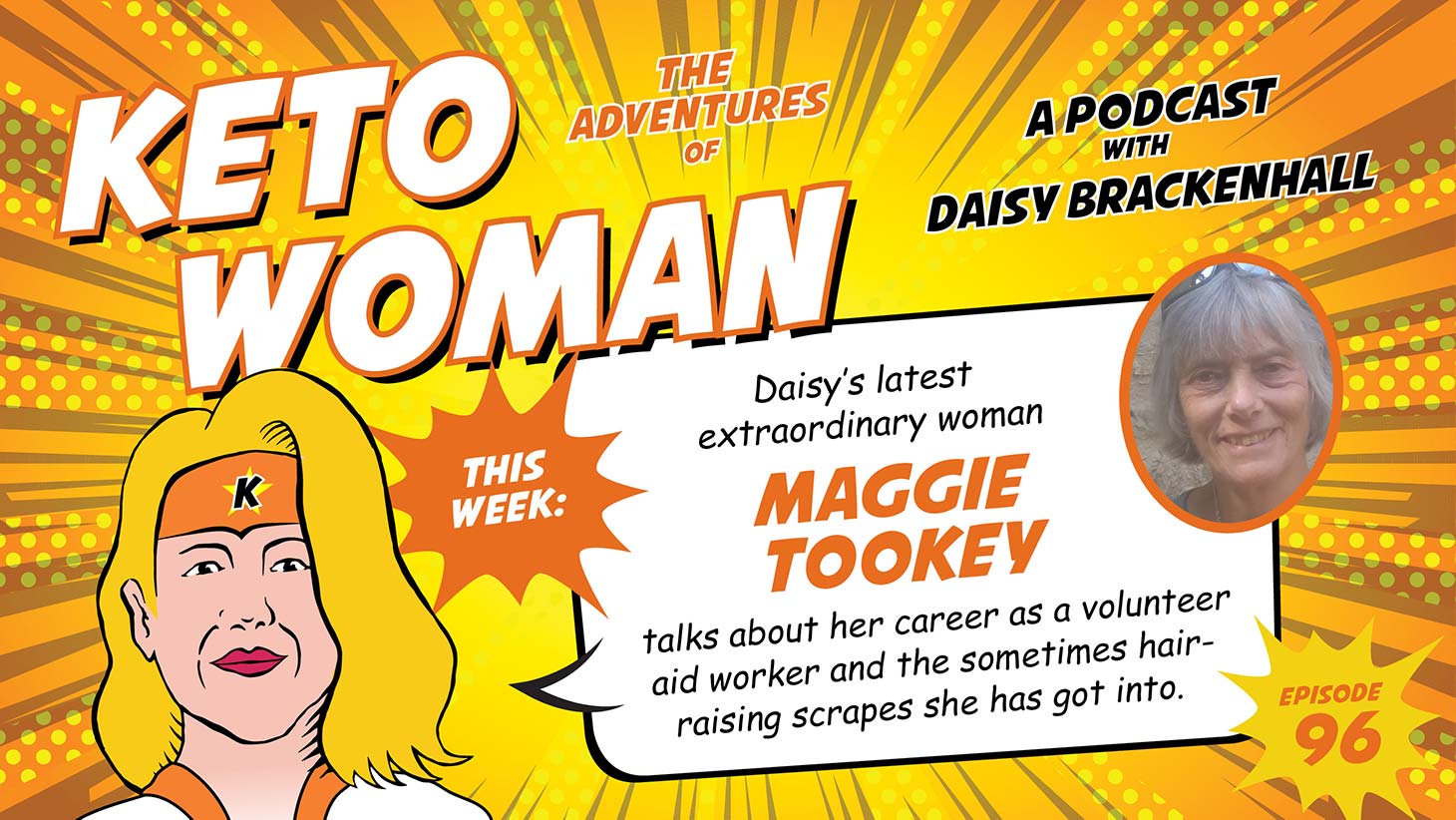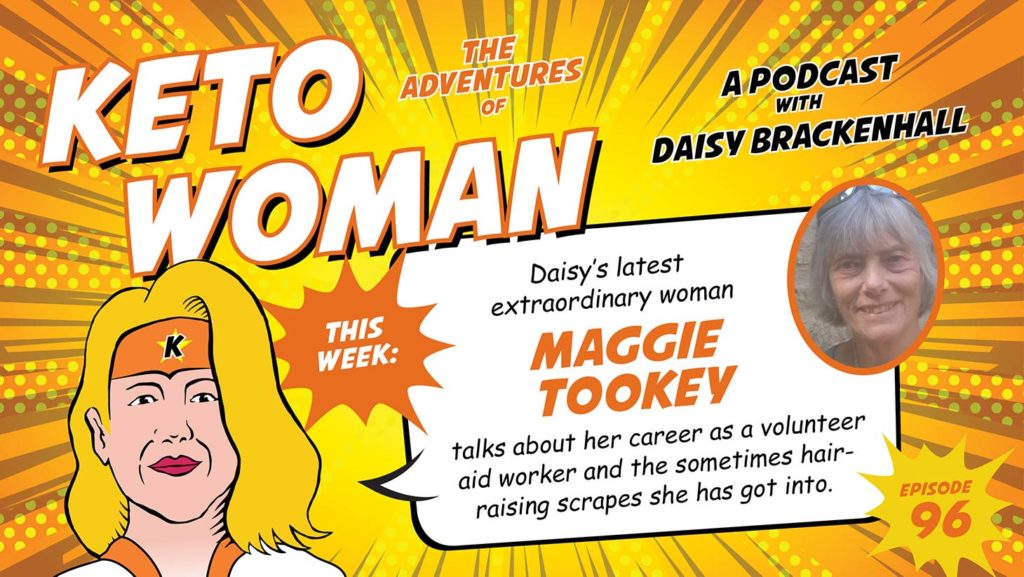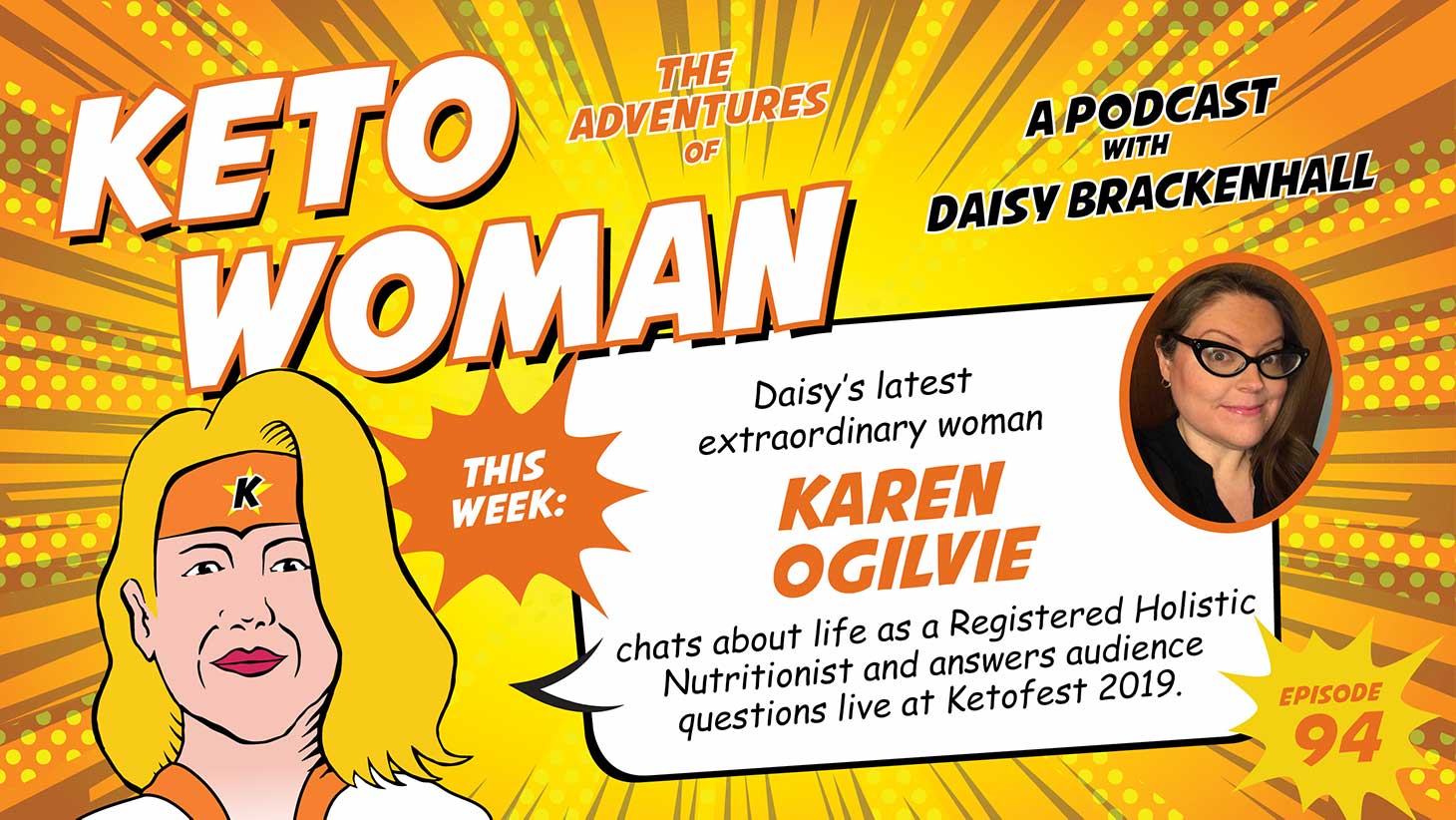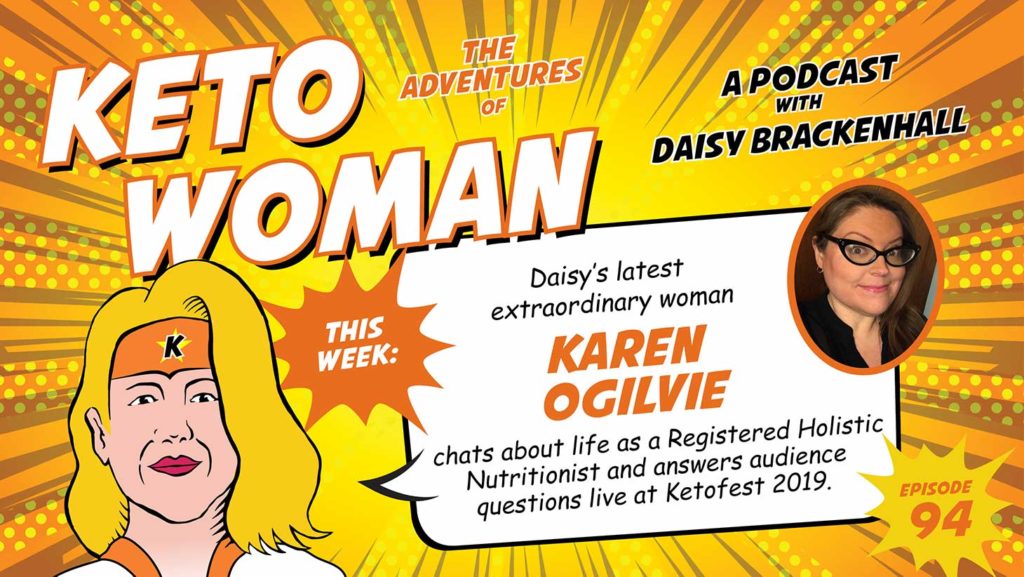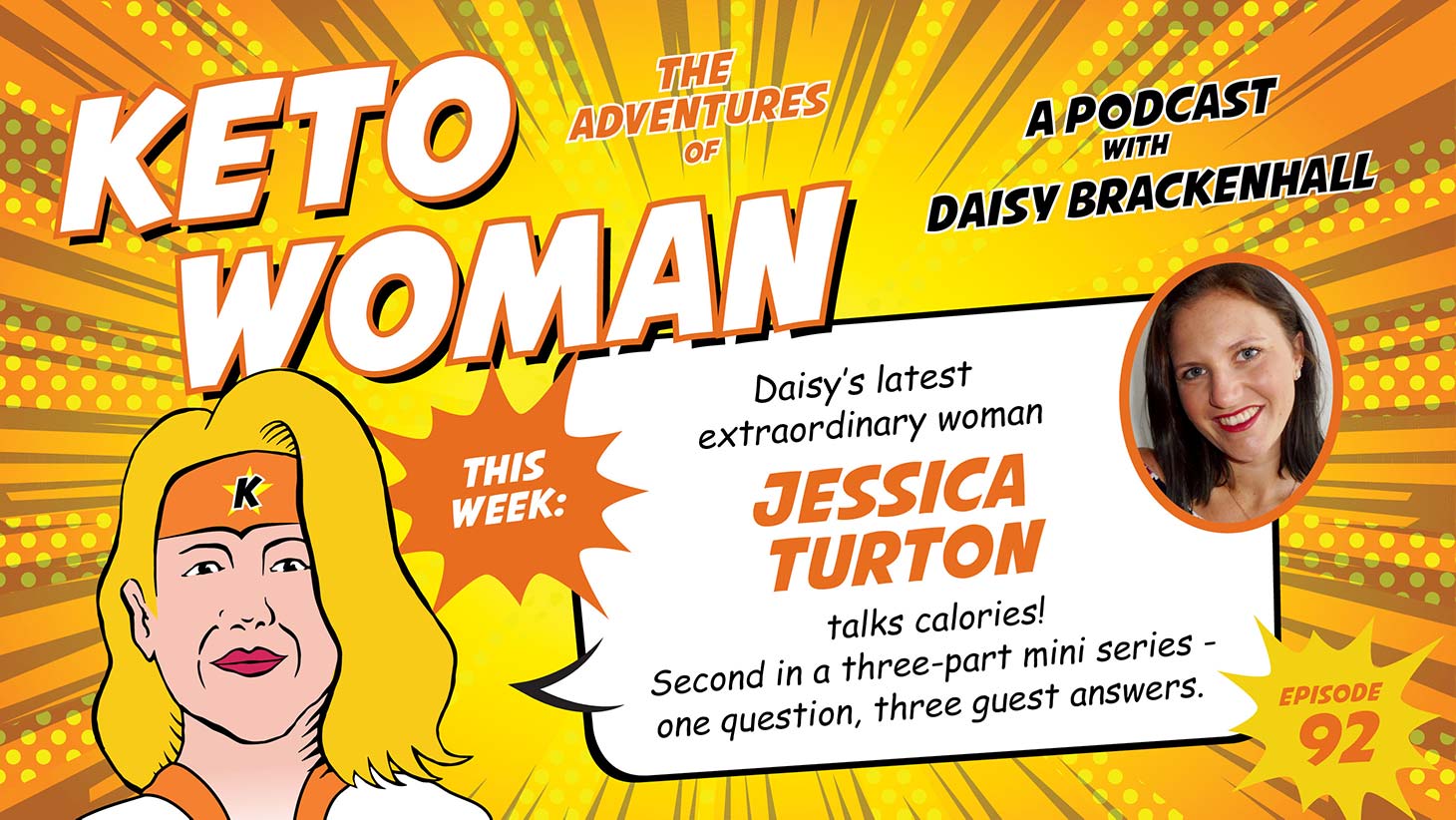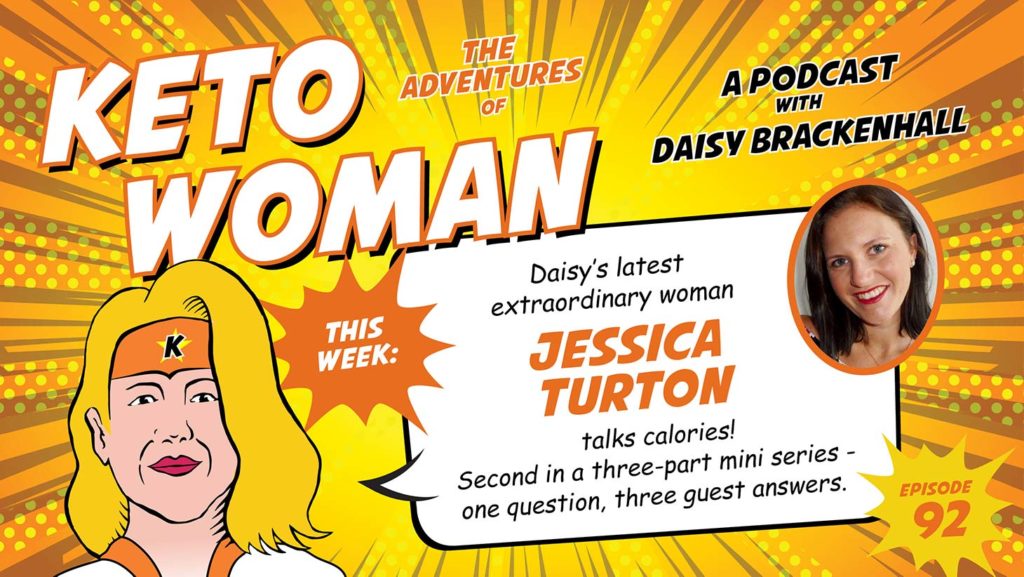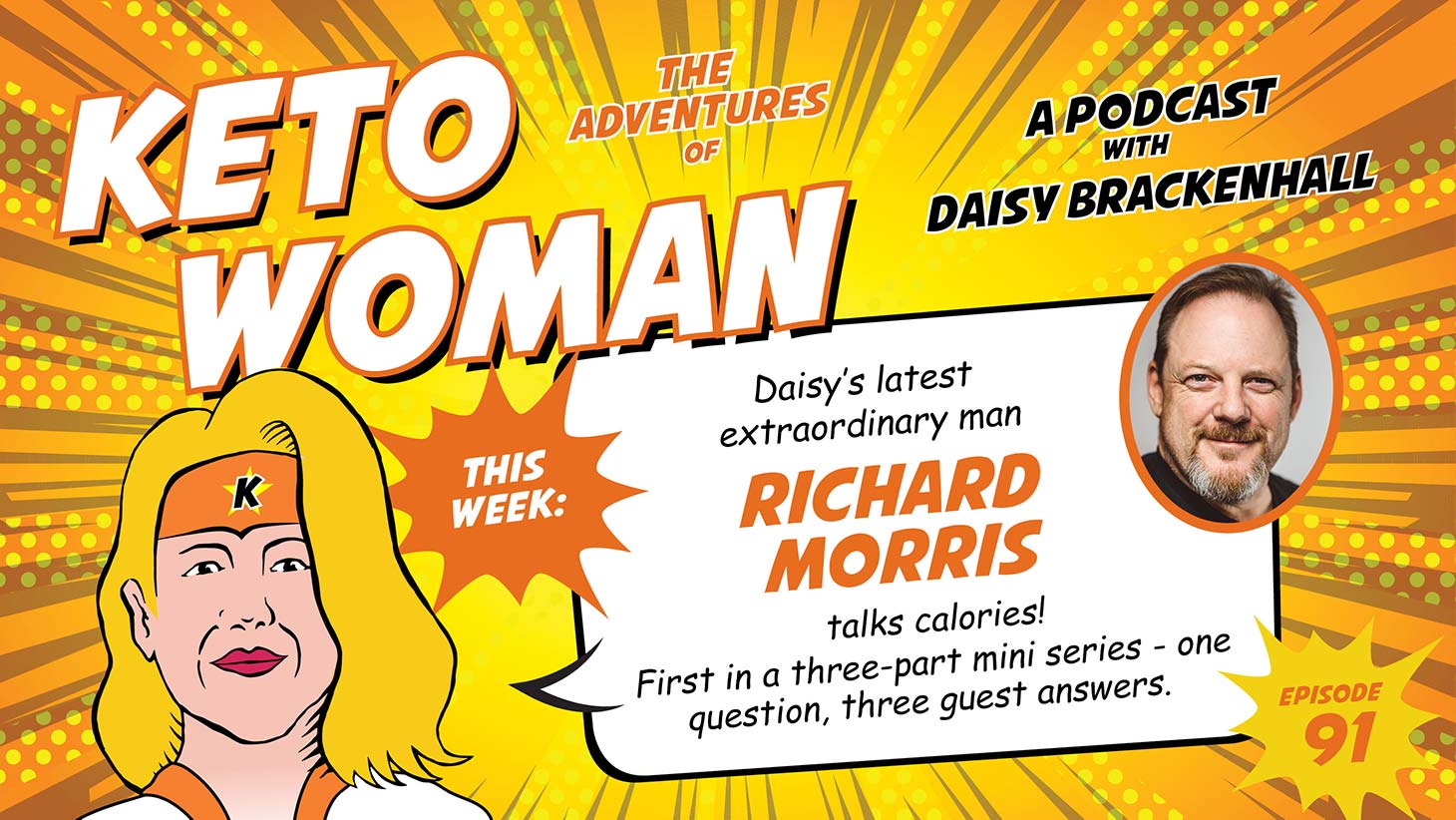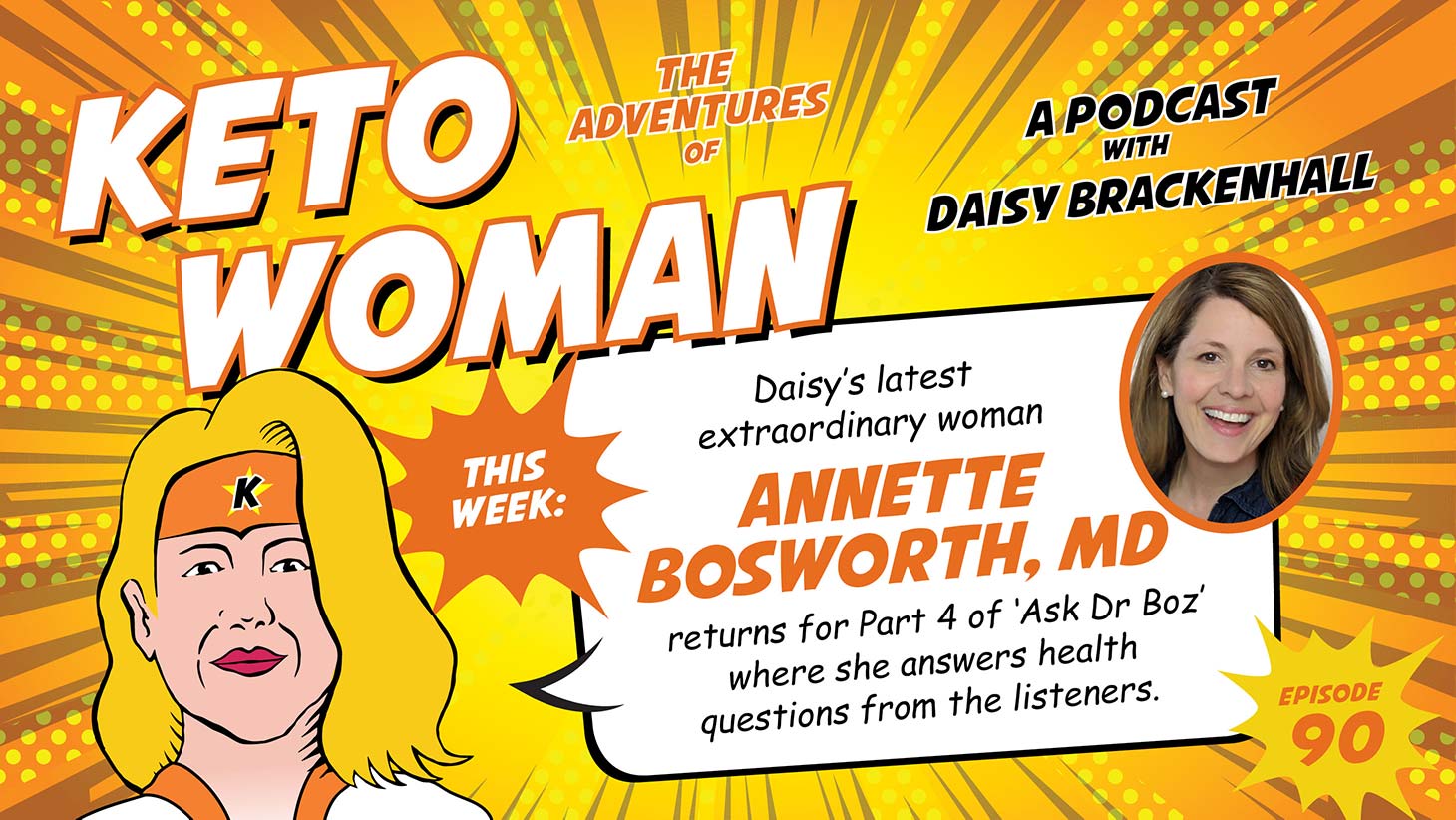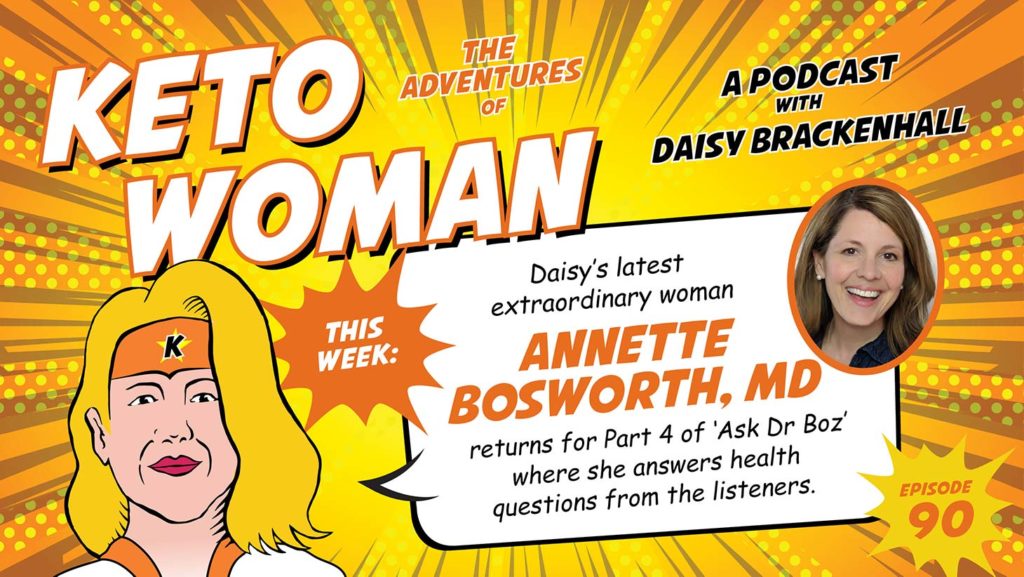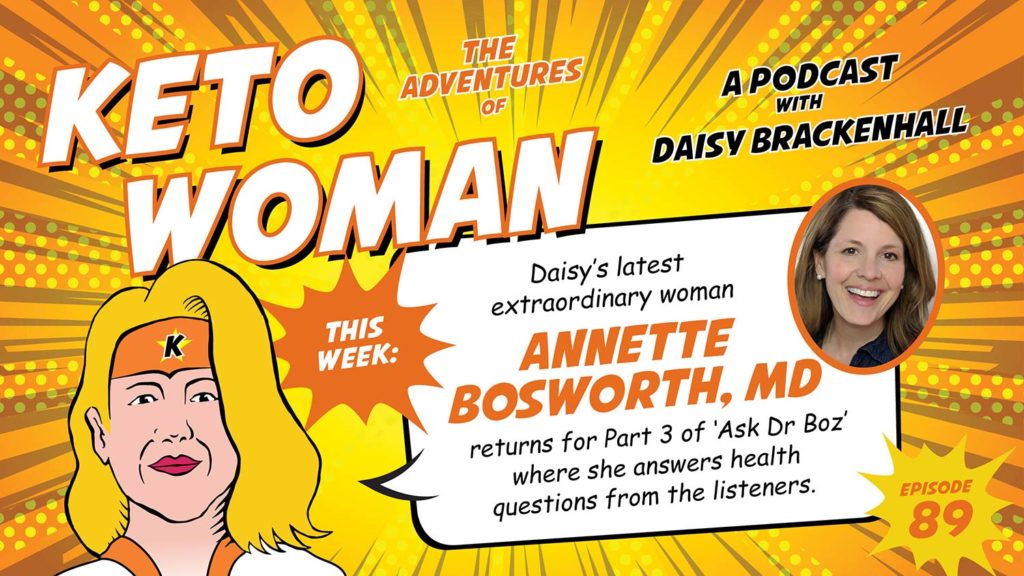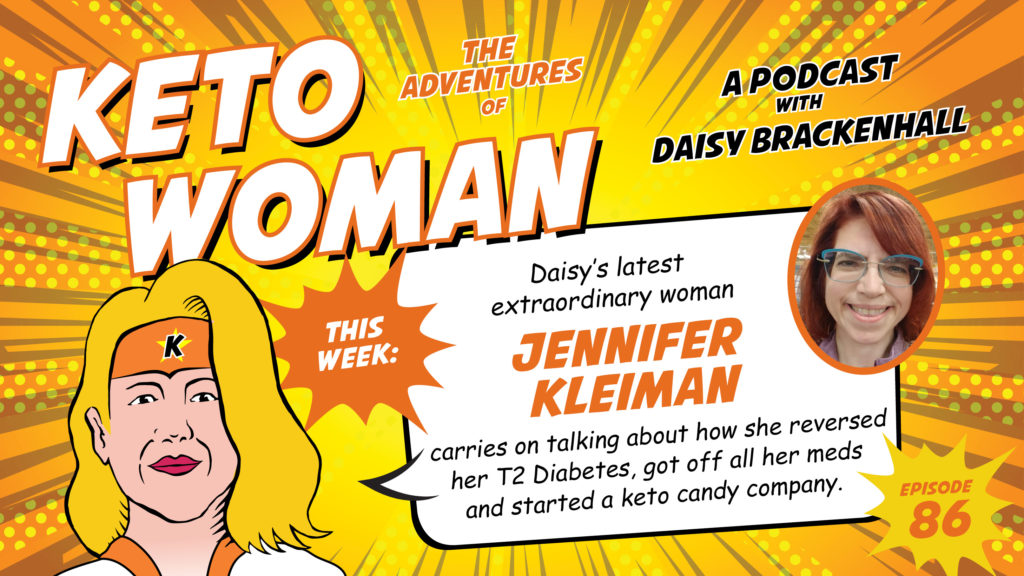This transcript is brought to you thanks to the hard work of Joell Abbott.
Welcome April to the Keto Woman podcast. How are you doing today?
I’m great, thank you. Very honored to be here.
Well, it’s lovely to see you. We have spoken before on Zoom so we have had face to face chat. We haven’t met in person yet, but I’m sure we will one day.
I can’t wait
So you know how this goes. You’ve transcribed a few podcasts and you’re a regular listener so I know you know how it goes.
Yes, I’m very aware.
Tell me a bit about you.
Well, I had a pretty normal life growing up and the oldest of three daughters. My dad worked for the County, my mom worked whatever job she was able to that allowed her to stay at home and raise the kids, but you know, still be the proud woman that she was. We worked together for dinner every night. Our meals were, my dad was what my mom called a meat and potatoes guy and so we would, you know, have meats and some vegetables, a little bit of starch. We never really had snack foods very often. Processed food just wasn’t really a thing in our house for a long time. My mom believed from whatever information source she had that you should have a starch at every meal. So we would have potatoes or she made the best spaghetti. I could eat her spaghetti forever, but that was pretty normal.
I didn’t really have a real big weight issue when I was younger. Started probably around junior high, so seventh or eighth grade. That was also around the time I started getting regular episodes of depression. In high school I played sports, but other than that I wasn’t really an active kid. I was a reader.
What is that sort of mid-teens? I never know exactly what age you’re talking about when you refer to the different grades in America.
7th grade is about 12, 13 and that’s also around the time I got my first period. So a lot of hormonal things going on there. Probably played a part in several of the things that I was going through, like the depression and anxiety. just kinda worrying a little too much about everything that was going on around me. I started having problems with my self esteem around that time too when I got to high school. So that’s ninth 10th grade, 15,16.
I, like I said, I played sports, but there was almost always a period of time between when classes ended and practice began or waiting for the bus to take you to the next game you were going to play. And I started to fill my time visiting vending machines and I would fill my bag with snacks because I was bored and there was nothing else to do.
And then when you go for an away game and the bus is taking you wherever with your team, if it’s pretty far away, they’re going to stop somewhere and let you some dinner. And of course it was always fast food. There was a gas station across the street from the school and I took public transportation about 10 miles home. So I would sit at the bus stop and if it was taken long enough for the bus, I just pop into the gas station and grab more food, which is of course it’s always snack food. So not good stuff for you at all.
And I would do that and I would eat it on the way home and then I’d go home and have dinner with the family. So it was just kind of this cycle of a progression of going from fairly healthy at home, cooking meals to just more and more processed food all the time. And it became my go-to, whatever my emotion was, whether it was boredom, you know, I had a frustrating day at school or whatever the case may be. I just started turning to food after high school.
I got my first job and well, my first real job and it was working the cash register at a fast food restaurant. I was in that job for close to 20 years. It was an absolutely horrible job. I did have other jobs at the time, but I always ended up going back to fast food because I was really good at it and it was comfortable for me, but it really was awful. I worked my way up from the front counter person taking orders all the way to the store manager.
I was a troubleshooter for a period of time, which is a manager who goes from store to store, gets them in line so that they’re performing well again and then moves on to the next store, which is, it can be pretty stressful because you’re moving in over another manager and pointing out everything that they’re doing wrong. And so, you know, there’s some hostility there.
You’re always kind of the enemy.
Exactly. That’s exactly it.
And is that the sort of element that was when you talked about it being a horrible job. Is that part of it?
Very stressful. It was a very stressful job. Customers are horrible. Anybody who works in public service is gonna tell you that even though the customer is supposedly always right, they’re pretty awful about it. I’ve had food thrown at me, I’ve been threatened because one of my employees forgot to not put pickles on somebody’s sandwich. It’s not a good environment. On top of that, how we were treated by the people that we worked for was not stellar by any means. We were scheduled for 60 hour shifts, but as the store manager, I was constantly on call. There were many, many times where I’d get a phone call on my day off somebody who didn’t show up for their shift, so I’d have to go in and work, you know, a double shift. There were a couple of times where I actually worked three shifts in a row. I never got chance to go home and sleep and you couldn’t get time off if you needed it. Everything was about..
It doesn’t sound like the time off that you were thinking that you had off, you know, your weekend as it were, that the time off that you’d expect every week. It doesn’t sound like you could ever rely on it. You couldn’t make plans for proper downtime.
Exactly. You couldn’t make any plans. Like I remember I had to almost bribe somebody to cover a shift for me so I could go to my grandmother’s 90th birthday party and my sister’s college graduation. You know, important things that other people in the world can go to. Right. But your fast food manager, you have to be here whenever we need you. And we don’t care what’s going on in your life. You shouldn’t have a life. You’re supposed to be here. yeah, it was just, just super stressful. I had a few anxiety attacks because of that job. I ended up in the hospital twice, several years apart, but both times I thought I was having a heart attack. My anxiety was so bad. Managers got free food, so I had lots of access to things that were not good for me. I drank soda all the time and always the sugar sodas, right?
Like I used to joke that when I die, they’d find dr pepper in my veins. And I thought it was funny. Now I’m horrified that those were the, those were the thoughts that I was having. But, you know, free French fries, burgers, milkshakes, everything. I didn’t eat a lot, but I was eating it, you know, every single day because I couldn’t afford really to buy much in the way of groceries. And why would I? Because I was getting free food. I didn’t really know that that stuff was bad for me. It was what everyone ate.
And I bet you weren’t allowed the time. Even if you were having that food and you know the kind of choices you made within that environment because as we know there are, there are ways to eat healthily in most fast food joints, but I bet you wouldn’t have been allowed the time to actually sit down and take some time and have a proper meal.
That’s absolutely right.
I bet you were just grabbing mouthfuls here and there pretty well consistently, you know, all the way during the day.
Yes, there were many days I didn’t have any time to sit down and eat and so you’re right. I would just go grab something, pop it in my mouth and then run off to the next thing. Probably a lot of grazing, you know, none of the stuff obviously was the kind of food that I was used to. You know, my mom made home cooked meals every night, but nobody ever really said anything. People commented on my weight.
Of course I had the standard 15 or 20 minute visit twice a year and the doctor would always tell me, eat less, move more, right, eat more salads and get more. And then that was the end until the next visit. Nobody ever really directed me on, these are the things that you’re doing that are probably not really good for you, so let’s do this instead. I never had any of that until I started getting more and more sick.
I did go through some time where I was trying a lot of different diets. I did Nutrisystem, I did Slimfast. I never did Weight Watchers because I think I knew even back then that public shaming wasn’t going to be my thing. I had an aunt who was in weight Watchers and she told me, yeah, you go in and you get weighed in front of everybody and then everybody comments on how well or not well you’ve done. And that was not for me.
I was going to say. Yeah, that doesn’t sound like much fun, does it?
No, no. I even did this weird crazy thing where you attach small metal balls or beads to your outer ear and it was supposed to help curb your appetite or something. It didn’t work.
It doesn’t sound like it would work. No.
Don’t even remember whatever. Supposedly science there was behind that. But you know, I mean I was, I was desperate, you know.
I do kind of remember, actually, I vaguely remember there was supposed to be some kind of pressure points around your ears somewhere. Maybe that’s what it was. Yeah. It must’ve been something to do with that. I do vaguely remember reading that. Yeah.
Yeah. I did Atkins. I lost 80 pounds doing Atkins, but then I ate a noodle and gained it all back plus some right. At one point later in life, I was engaged to be married. I broke up with a guy about a month before the wedding because I found out that he’d been cheating on me the entire five years we’d been together.
At that point, I fell into a very, very deep depression. I could hardly function. I was kind of on the outs with my family at the time, so I didn’t really have anyone to turn to you. I was fighting through all of that emotional pain alone. It was so hard. I remember one day I’m working the drive through and I was crying in between customers. I would take an order, start bawling again, take another order, keep crying. I mean it was just, it was so hard going through all of that, but that was the day that I decided, okay, enough is enough. No man is worth what I’m going through and I need to work on me. I need to start healing my heart. And yeah, so it was tough. But obviously I got through it.
My son was born in 2003 I was a single parent still working in this very high stress environment. I had headaches all the time. I used to keep up 500 count bottle of ibuprofen on my desk and I ate it like candy all day long. I was fortunate in the fact that I had my parents to turn back to when I would get those late night calls or you know, the weekend calls. My mom eventually became the family babysitter. When my sister started having kids, it was just a blessing. I don’t know what I would’ve done if I didn’t have them finally babysitting for middle of the night phone calls or this is the 12th day in a row you’ve needed me to babysit. You know, the, it’s just impossible and very expensive. It was real great when my mom did that.
Then in 2009, I lost my job, which of course caused another very, very serious depression, I’m the kind of person who’s kind of defined by my work and my work ethic. I’m probably more on the extreme side of the work ethic. I had never in my life lost a job. It was just devastating. It was unfathomable to me that I had lost that job. I didn’t really know who I was without work and I had no income.
Well, especially when you, when you put so much into it, despite seriously.
Yes, definitely. I mean, I gave that job my life for almost two decades. All the blood, sweat and tears, and in return I got booted. I mean, it turned out to be a blessing in disguise, right? I mean, I probably shouldn’t have stayed at a job that was giving me anxiety attacks and the stress and depression and all the, all those horrible things, but at the same time we have a comfort zone and even if it’s painful, sometimes we stay there because it’s comfortable and we know it. Right?
Change is scary, isn’t it?
It is absolutely scary, especially something you’ve been doing for so long and then all of a sudden you’re thrust into the unknown and you’re just like, Oh my gosh, what do I do? I don’t even know what to do anymore. I had managed to save a little bit of money so I was still able to pay the rent, but I ended up on unemployment of course. And I was also on WIC, which is government assistance for mothers and their children, and I had to do all that so that I could still pay my bills and keep food on the table. And to me it was very demeaning. The negative self talk I had was so real. I mean, at that point I very literally hated myself for the situation I had put myself into. It was really all I could do to get through the day. And I don’t know if I would honestly be here now if I didn’t have my son at the time. I couldn’t leave him, but I was in a real deep, dark place at that time.
So I started working whatever jobs I could find. Eventually I ended up working at a convenience store, which is probably not the best place for somebody with a food addiction. So very easy access to more crappy food. I gained 90 pounds in less than a year after I lost my job. Near the end of 2010 I finally found full time work in the finance world. So I had begun a second entirely new career. I had that job for five years, but it was also very stressful and at the end, the work environment was very, very toxic. I was still gaining weight. My food choices were just ridiculous. I can think back now and wonder how it was that I hadn’t killed myself with food by that point. I remember the look on a friend’s face when they saw me dipping Fritos and beef jerky in ranch sauce. It was just incredible.
My sleep was horrible. I was exhausted all the time. I remember feeling like I was dying when I would try to go to sleep. I actually got to the point where I would say a little prayer when I went to bed thanking the Lord for my kid and asking him to make sure that he’s taken care of if I don’t wake up tomorrow. It was, it was, it was just awful. I had constant migraines almost every single day. One day I actually fell asleep at work. This was my new job. I was horrified. I went and got tested and I found out that I have severe sleep apnea. When I went to the clinics, CPAP class, the doctor and all his staff said thank God and told me they were glad I showed up because my apnea was so severe that I should have been dead.
Wow. Really?
Yeah, so it’s considered an apnea. If you stop breathing for 10 seconds.
Okay.
If you have five or more episodes an hour, you’ve got sleep apnea. Severe sleep apnea is defined as 30 apneas an hour. I had over 740 apnea was the night that I was tested, so I averaged about 105 apnea as an hour and each one lasted on average for 13 seconds. So I essentially was having to apnea as a minute, which is basically hold your breath for 13 seconds, take two big breaths and then hold your breath again for 13 seconds and just keep doing that over and over. And that’s what I was doing in my sleep because I was doing that. I was never getting into REM because my brain was waking me up to remind me to breathe. And that’s actually why I felt like I was dying. I kept waking up on the brink of falling asleep and thought that I was drifting away. And I had been doing that for at least four years. It was crazy.
So after I was diagnosed with sleep apnea, I was also diagnosed with type two diabetes, which was devastating to me because my dad already had it. And both of my grandfathers who had both died from complications from the type two diabetes. I got really thirsty at work one day I just have this unquenchable thirst and I went across the street and bought a half gallon of orange juice and I drank the whole thing in one go. I just couldn’t get enough of it. And my friend said, I think you need to go and get checked out. That really sounds like diabetes.
And so I did. I got tested and the nurse practitioner called me at nine o’clock at night and said, you have to come in tomorrow morning. We need to talk to you. It’s urgent. Of course, I got real worried and I went in and they told me that my blood sugar was somewhere around 450 my A1C was 14 so they put me on Metformin.
Fortunately, I never went on insulin. I was able to control the diabetes pretty well with the Metformin despite eating the standard diet that they give to diabetics. Right. I actually gotten my A1C down to 8 one point in 2014 I went through a really traumatic experience with a narcissist and that brought back all the depression and the self loathing and my diet totally went out the window. I had some more medications added to the pile. I was already taking two different medications for anxiety. I was already on a Statin plus the Metformin, Glipizide, a couple others. I can’t remember.
What were you doing from a diet point of view before it went off the rails? You were just trying to white knuckle it through the hole, you know, trying to control it as it were with the typical eat less, move more and dropping the fat content and all that kind of stuff. I guess the typical advice.
Yes, that’s exactly what I was doing. I did the whole chicken, broccoli and rice, you know, lots of rice. Rice is good for you.
So pretty miserable. Before then, there was no real comfort you were getting from food?
No, I never felt good on any of the diets I had been on. I would see some successes as in I might lose a little bit of weight, but I never felt good. I was either always hungry or I’d get irritable, so maybe hangry. I didn’t even realize that I was inflamed until I found keto.
I think the only way you tend to feel good is from that virtuous aspect. The only thing that feels good about it when you’re white knuckling your way through a diet that you’re not enjoying, you feel hangry all the time. The only good thing about it, the only time and the reason that that gives you to have any kind of sort of high spirits is that your sticking to it and maybe things are going well because maybe you’re losing some weight or something. I think that’s, for me anyway, that’s the only sense of any kind of anything that approached being happy. I got out of it.
Agree 100% I was proud of myself for being able to do something so hard despite the fact that it didn’t make me feel any better or heal me even. It was more of an emotional effect than a nutritional effect.
So it’s not surprising. Then when something really hits you from an emotional point of view that there’s just no way that you’re going to be able to continue with something that is so awful to begin with.
Exactly. I remember my dad, of course, he was concerned about my weight. He offered me a brand new wardrobe. If I just lose a hundred pounds and I’d go to him and say, dad, I found this new diet. I’m trying this, I feel good and it’s working and I’m really sticking to it, but then I didn’t because it wasn’t working and I didn’t feel good. I got my first bout with a very serious infection called cellulitis a few years ago, 2015 I think, and that’s a bacterial infection in the deep, deep layers of the skin. It eats away at you from the inside. It can lead to sepsis and if it’s severe it is life threatening. It’s extremely painful. It feels like a million glass shards stuck inside under your skin.
When I got to the hospital, my fever was 104, I had sepsis. I was there for a week. I was on constant antibiotics. They were giving me, gosh, two or three different kinds of antibiotics through an IV and I think they were giving me some oral antibiotics as well. They were just drowning me in antibiotics for this. It was so bad that I gained almost 50 pounds just in inflammation. Of course my weight was ridiculously high at that point, so when it was time for me to go home, they gave me what’s called a pick line, which is a tube that they insert inside your arm and it runs all the way up your arm and to your heart chamber so that you can inject antibiotics there directly so it gets pumped out right away and that was so that I could continue administering the IV antibiotics myself at home. I was on medical leave for weeks.
When I finally was able to go back to work, I had to walk with a cane because I was limping so bad. The cellulitis was in one of my legs. I had to keep my leg really elevated, so it was very uncomfortable trying to work a desk job with my leg sticking out to the side.
Actually I had cellulitis four different times. Once you get it, it’s much easier to keep getting it. Happily though the last one that I had was in 2016 which happens to coincide with when I found keto, so when I found keto, there’s kind of a story to that.
Someone I knew at the time had told me about this totally crazy diet that he was doing that would supposedly cure all my problems. Right? And this guy was, he was very fit and healthy, but I didn’t believe anything that he was telling me. Don’t eat carbs. Right? Your brain needs sugar. You know glucogoneo… what? That’s not even a thing! You’re stupid!
You know, I just thought I knew everything. Right? You ate an entire package of bacon for lunch and that’s all you’re eating today. Give me a break. My doctor’s already told me everything that I need to know. Right?
So I was just totally self righteous on this path of he was wrong. And I was right. We had some pretty heated arguments about what was best for me. He pointed me to the keto subreddit. I didn’t use Reddit at the time. I have an aversion to toxic communities. But I started reading some threads, if not just to have enough information to go back and research somewhere else and prove him wrong. That was really my motivation. so I started reading some things and enough people were posting successes and defending them with sciencey words that my curiosity got triggered.
People talk about how anecdotal evidence is worthless. Yes, but when push comes to shove, those are the stories that grab your attention. Those are the stories that make you think, Whoa, hold on a minute. If they can do it, perhaps I can do it and perhaps I can get at least some of the results that they’re getting.
Exactly. I’m a very curious person by nature. My two favorite words are why and how I probably get a little annoying with them.
I bet you’re a questioner.
I absolutely am. A questioner. Yes, yes. I actually have a little bit of rebel in me and I can’t remember the other ones, but yeah, I kinda, I kind of go through cycles, so I’m real good at research. So I started paying a little more attention to the articles that people were linking, spent all day Googling, going down all these different rabbit holes, you know, having 30 different tabs open on my browser. I found Dr Berry’s video that’s you know, kind of famous now, which is the really sarcastic video about why you should not do keto and sarcasm is my native language. I loved that video.
Then I started listening to the 2ketodudes podcast, which was my first ever podcast. I was drawn to it because of the science and like you said, testimonials are the things that get you thinking. Maybe I can do it, but I want it proof. I didn’t just want the testimonials because anybody can say, hey, this is working for me. Right? It’s the internet, everything’s true or not. Right. I wanted to know why it was working or where people lying because I’d been trying different diets.
I was vegetarian for a while. I was on this quote unquote healthy diet that consisted of gallons of fruit and veggie juices. I was proud of myself for spending a couple hundred dollars on a juicer and a lot of money on fruits and vegetables just so I could make myself a little tiny glass of juice everyday.
Best of the whole virtuous thing again though, isn’t it? It feels so virtuous and pure and clean to be drinking basically a shit ton of sugar. Yes, exactly.
I’m not a cook because I spent so many years in that toxic environment cooking. I just, I don’t want to do it anymore, but I was so proud of myself that I was able to create veggie burgers with a ton of beans and all these other things. You know, I was doing the right thing finally. I did the whole forks over knives thing. I watched all their videos and their quote unquote science and I totally fell for all of that. This was the only way for me to be healthy, right? Not right.
I actually went through a period of being pretty angry when I was finding out all this information about keto and all of the things that it could fix in the human body. Because while I was doing this research and learning, that’s when my dad died and he died from liver failure, kidney failure and heart failure, all brought about by his diabetes that he had had for, gosh, I think it was two decades and it made me so mad that this information was out there and nobody was telling my dad. He was on dialysis, he had dialysis at home. There was surgery that he had to insert basically a pouch into his stomach so that he could pump all these chemicals into his system because the system wasn’t working on its own. It was just a horrid ordeal for my dad. His last few years were awful and it was awful to watch him go through that.
And so I just got infuriated that all of this information was out there, but nobody shared it or at least nobody who could help my dad. And part of my motivation for going through all these other diets was to find something that I could maybe help my dad with. You know? I mean by the end, he couldn’t even eat. He was always a big burly guy. And when he died, he was 90 pounds. It was not, it was just not a good way for him to go. So, I really try not to think about that too much because I will still get angry about it.
Of course.
But I don’t think that’s a healthy place for me to be, but it’s part of why I share things in the group is to show other people that you don’t have to live like that. So I learned on the 2KetoDudes that Reddit had done me wrong. In Reddit I was told over and over and over again that if you’re already fat, your keto should be low carb and low fat. Don’t eat any fat because you already have enough.
Carl and Richard of course said, no, no, no, you need the high fat to get your body primed and used to burning fat. Your body doesn’t know how to access it anymore. And I had been doing keto for almost a year by that time, of course, with no weight loss or any significant loss of inflammation, which were two of the biggest results that I was looking for.
So I started over, I tracked and I made sure that my fat was higher than my protein. I stayed under 20 grams of carbs, but I was counting net carbs. I was eating mostly good food or what I thought was good food, like you know, chicken breasts, lots of vegetables like broccoli and cauliflower. I did still eat a lot of snacks. They were keto snacks, but I was eating all the time still and I would eat a lot of processed meats like beef jerky, sausages, things like that. I learned about fasting around that time and I tried it, but I wasn’t ever successful at it because I was too hungry all the time and I also had a serious mental block about it. I was literally panic at the thought of not eating.
After doing that for several months and still not seeing the results that I was looking for. I got really, really discouraged and I let the holidays do their thing. I ate all the food, the bad food. I felt awful. I got sick and one day a coworker said to me, you know, it’s not worth it. That stuff makes you feel awful. It’s just not worth it. And it kinda clicked for me again. She’s right. Even though I’m not seeing all the results I want, I was feeling so much better on keto. I was not walking like a 90 year old woman anymore. I had plantar fasciitis that was gone. My depression was much less severe and it didn’t come around as often as it used to, which was a big deal because I’ve been depressed almost my whole life. And so those results were enough to get me back on track and ready to recommit again.
I kept coming back to keto even though I wasn’t getting the results that I wanted because the science was there. All the different podcasts that I started listening to, all the research that I was doing following Annette Bosworth, Dr. Berry, of course, 2KetoDudes, Keto Woman podcast, everything included science and everybody pointed to where they got the science from, which is something that I had never seen on any other diet. Everybody just said, well, it works because it works, but it wasn’t working.
Yeah. Just, you know, stop asking. So many questions. Just trust in the process. Trust that it works. Nope.
Right. I want to know why. Right. Faith-based dieting did not work for me. I had no faith in it anymore, so I recommitted again. I was really, really focused on getting the food right. I had decided that, well, I just wasn’t following keto strictly enough, and that was the problem. I’m the problem. Right. My choices are the problem.
It’s gotta be your fault. Right?
Right. Exactly. Because that’s what we’re told. Right? If whatever you’re doing isn’t working, it’s your fault. You reminded me that it’s not just about the food and that I needed to look at all the other things. Sleep stress, eating window, you know, there’s a whole list of things that can affect your success. But I was hyper focused on the food and at that time my family situation was particularly stressful. Some toxic relationships there. Still dealing with the loss of my dad and the aftermath of things that happen with that.
Mom’s Alzheimer’s was much worse. She had finally been diagnosed and her decline was pretty rapid. So even though I had all those things going on, I never considered that that affected or would affect what’s going on in my body. I tried fasting again a couple of times, but I still really had a hard time with it. And this time, not only was it hard mentally, but also physically because I had to get sick when I started eating again.
So I decided I would try carnivore. Still keto but stricter, right? Just kinda trying to dial down more into the why of why isn’t it working? I was bound and determined to figure out why keto wasn’t fixing me. So I went very, very strict. I was always under 20 grams of total carbs on keto. At this point. I thought again that I was getting my fat ratio appropriate, stopped snacking. They were rare. So though I started the carnivore with just meat, a little bit of cheese, some eggs, the eggs made me feel unwell, so I stopped eating them. I had things like pork chops, bacon, chicken breast. Again, because I love the white meat. I prefer it over the dark, steaks, ground beef. I drank beef broth instead of coffee because coffee made my stomach hurt.
So as I was cutting things out, the things that remained, I was able to tell that they were part of the reason I wasn’t feeling well. I think that when you are not feeling well all the time, you get used to it and you don’t really know that, you’re sick, that you’re not feeling well. The things are making you ill because it’s just what you’re used to.
What did you do? Kind of acclimatise to it, don’t you? It’s only when you take it away for awhile and then you put that food back in and it hits you all in one go that you realize how bad it was. It’s just cause you’d had these doses every day, every day, every day. Your body just adapts to it, doesn’t it? And you, you have this, what is seems like a lower level, but chronically, you know, it’s all the time, but when your body actually gets a rest then you hit it feels like you’ve been hit with a truck.
Yes, exactly. I did things like put heavy whipping cream in my coffee, which was for the fat content, but also for the sweet content. I was still having a difficult time with sweets, cravings. And I remember you and I had talked about that and you suggested, you know, we’ll try, try not to have anything sweet for a week and see if your cravings go away. So I did this, carnivore for about three months and I still didn’t see any change in the weight or the inflammation.
I was definitely feeling better physically. But the weight and the inflammation, those are the results I’m looking for. Not because I’m vain and want to lose weight. So I look better. It’s because I am heavy enough where not losing weight, it’s not an option. My doctor told me, I don’t know if you have enough time left to lose weight slowly, and she recommended me for bariatric surgery and I almost did it. It was not for me. I couldn’t justify to myself cutting out a piece of my body because I couldn’t get a handle on food. And so I said, nevermind, I don’t want to do this. And continued trying to figure out when and how keto would work for me…

